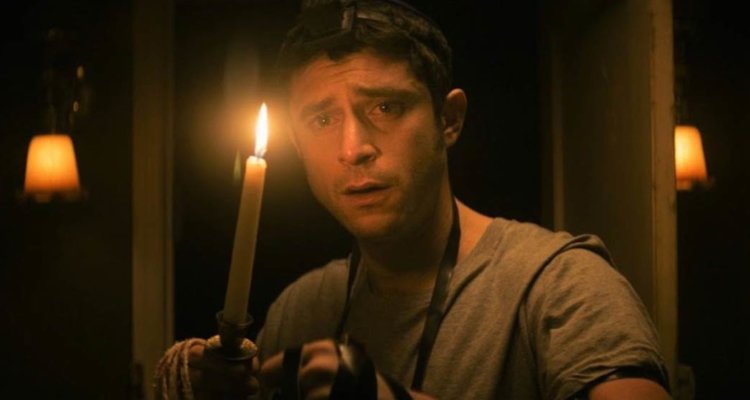Who knew that you could give arthouse horror a kick in the pants by substituting ominous Christian iconography for ominous Jewish iconography? Crosses, crucifixes, crowns of thorns, tormented priests and the like have been staples of the horror genre as far back as the beginning of cinema, if not, at least, Mario Bava’s “Black Sunday” and “The Exorcist,” and have remained in vogue in the form of everything from the uber-popular “Conjuring” franchise to the recent, terrific “Saint Maud.”
READ MORE: The 100 Most Anticipated Films Of 2021
The occasional downside of leaning too hard on Christian symbolism for shocks is that it can feel like an affectation or, worse, a trope. This is only one of the reasons why Keith Thomas’ directorial debut, “The Vigil,” feels like such a breath of fresh air. After all, how many proudly Jewish shomer horror movies can you even think of, off the top of your head? Come to think of it, how many non-Jews out there even know what a shomer is?
READ MORE: The 25 Most Anticipated Horror Movies Of 2021
A primer for those not in the know: according to Jewish law, a shomer is a guardian entrusted by a fellow member of a Jewish community (typically Orthodox or Conservative) with the custody of a beloved person or thing. As an opening title card at the beginning of this sparse, agreeably frightful new film lets us know, shomers are sometimes called upon to watch over the deceased. Discerning readers can no doubt see where all this might be headed, and from the outset, the hook that Thomas is playing with here is irresistible: what if a shomer was tasked with watching over a dead body that might not actually be dead?
READ MORE: The 25 Best Films Of 2020
I’m getting slightly ahead of myself. Our writer/director displays a real gift for atmosphere and world-building in his film’s first act, which situates viewers in the overwhelmingly Hasidic-Jewish Brooklyn neighborhood of Borough Park. The Hasidic community can be an unwelcoming place for outsiders, so it says something that Thomas manages to successfully immerse his audience in such a vividly specific milieu, particularly since the only other recent film to utilize Borough Park as a principal location was 2017’s wistful, small-scale indie drama “Menashe.” Menashe Lustig, the non-professional actor who starred as the titular Hasidic father in that aforementioned film, shows up in “The Vigil” in a supporting capacity, as a terse, barrel-chested local fellow named Reb Shulem; as touching as Lustig was in “Menashe,” it’s a dark delight to see work wonders in a more menacing register.
READ MORE: The 25 Best Films Of 2020 You Didn’t See
Alas, Lustig is not the protagonist of “The Vigil”: that would be Yakov Ronen, played by Dave Davis. Yakov is a well-meaning, somewhat hapless neighborhood schmuck whom Reb Shulem ropes into a hastily-planned shomer scheme one fateful evening. It’s a simple task: watch over a dead body for a night, don’t go anywhere, and don’t ask any further questions. As a performer, Davis is blessed with some of the same inherently compelling, wound-up intensity that makes Riz Ahmed memorable, and the brooding gravitas that he brings to the film ultimately informs some of the movie’s more cutting subtextual insights.
Once Yakov has settled into the creepy, claustrophobic Brooklyn apartment that serves as the film’s primary location, “The Vigil” starts going hard on haunted house jump scares, almost all of which are enjoyable, even if some feel ripped out of a James Wan flick. That said, to mistake “The Vigil” for just another elevated shocker would be to miss the greater point the film strives for. Horror fans will almost certainly get what they desire from “The Vigil”: demonic malfeasance, nerve-jangling sound design, patient pans down dimly-lit hallways, and the obligatory creepy old lady without whom no contemporary horror movie is complete (this time, said creepy old lady exists in the form of a dead-eyed bubbeleh played to terrifying perfection by Lynn Cohen).
Alas, these elements are the icing on the cake, not the real reason the movie exists. “The Vigil” is an intensely Jewish film in that, like Jennifer Kent’s admittedly less-Jewish “The Babadook,” it realizes that inherited trauma is spookier than anything a horror screenwriter could theoretically ream up. The screenplay’s insights into Jewish guilt are similarly adroit: through flashbacks, we learn that Yakov was an unfortunate victim of a hate crime on the streets of his neighborhood, and that he may have acted in a fashion that unwittingly led to even more tragedy. Sadly, “The Vigil” fails to totally stick the landing in a way that would make it genuinely great. It concludes with a shrug when it should end with a howl into the abyss; it’s almost as if the filmmakers are too attached to the plight of Davis’ thoroughly decent mensch protagonist to not provide him with something resembling a happy ending. Slightly disappointing denouement aside, “The Vigil” is an effective, stripped-down exercise in pure terror, and a strong argument as any for a new wave of Jewish Horror. [B].

